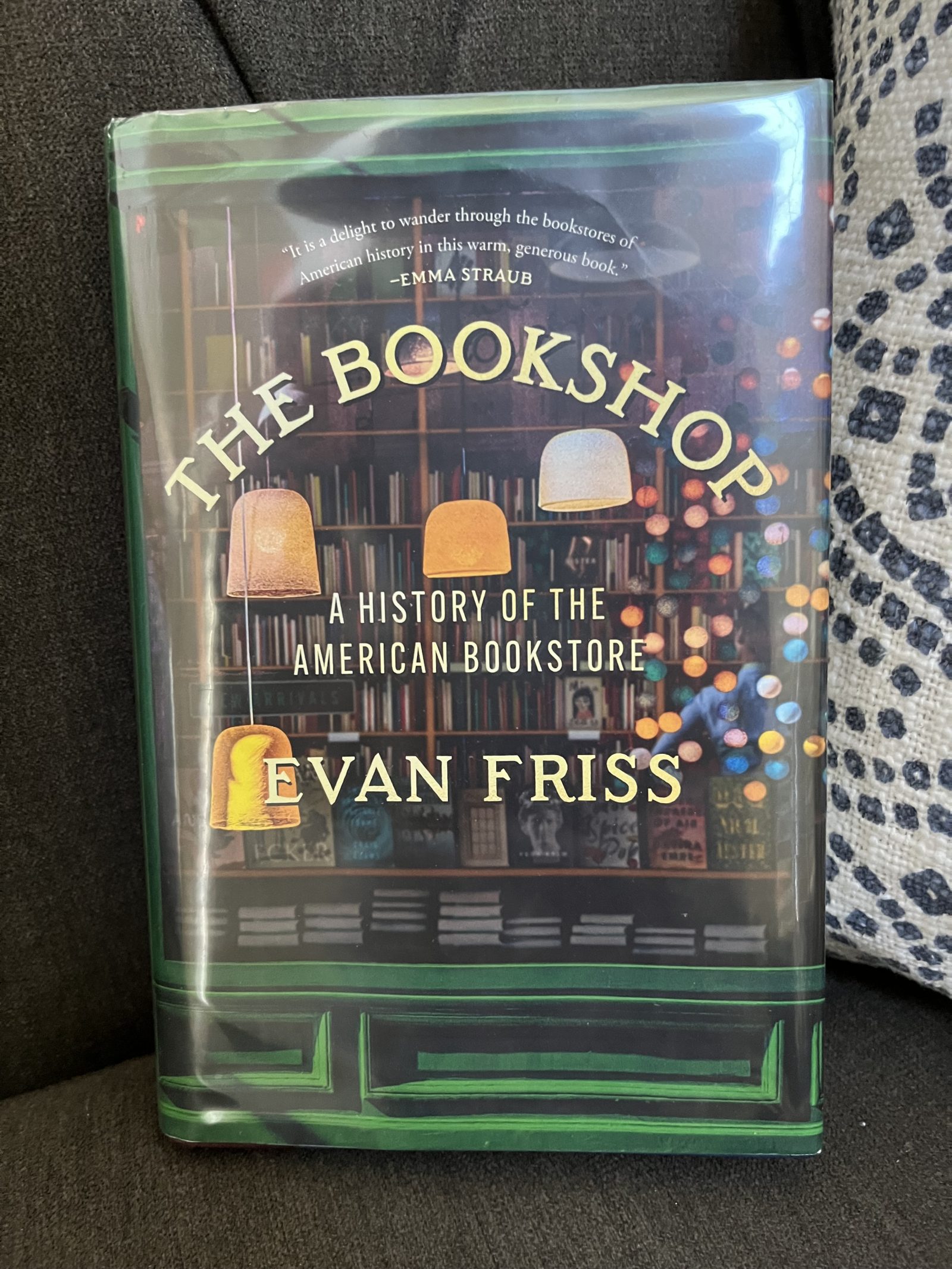By Evan Friss
This isn’t really a book review. The Bookshop is way too complex (and long!) for me to delve into full bore. (Here’s a review in the New York Times.) But I enjoyed it SO MUCH and recommend it highly, so I wanted to share a few comments.
The Bookshop has 311 footnotes (yes!) and an extensive index. So of course I scanned the index and was excited to see several of my favorite indie bookshops featured, which I’ll mention here, but first of all I want to say how disappointed I was NOT to find Burke’s Books, the oldest indie bookstore in Memphis, where I live. And where I had my first ever book signing (in 2012 for an anthology I contributed to) and again in 2017 for my first novel, Cherry Bomb.
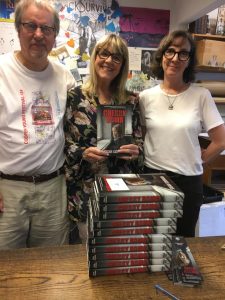
A number of years ago when Burke’s was still on Poplar Avenue and was struggling, I donated $100 to help them survive. I know, I know, it wasn’t much, but I really cared about them, and especially about their new owners, Corey and Cheryl Mesler. Later they moved to their current location in the Cooper Young neighborhood, where several of my premiere book signings happened.
A Favorite
But on to The Book Shop. I wasn’t a bit surprised to find the iconic Square Books in Oxford, Mississippi, included in the book. Oxford is special to me because I went to school at Ole Miss, and Square Books is special because they have welcomed me for several book events, including my first published book, my memoir Tangles and Plaques: A Mother and Daughter Face Alzheimer’s (January 2017). Over 90 people showed up for that event, which absolutely blew my mind. They welcomed me back several more times, and their booksellers and event people are top notch. But that’s not what Friss wrote about in The Bookshop. Ironically, their biggest mention was in the chapter about Amazon! It wasn’t so much about Square Books as it was about the owner, Richard Howorth (a fraternity brother of my husband when they were both at Ole Miss), who was also a former Mayor of Oxford, Mississippi. Here’s an excerpt from that chapter:
The Surprising Bezos-Howorth Connection
Bezos didn’t know a thing about bookselling. He was, however, an excellent student and signed up for bookselling school, or the closest thing to it: a four-day workshop held in conjunction with the ABA conference in Portland. The instructor was Richard Howorth, then president of the ABA and owner of the legendary Square Books in Oxford, Mississippi. Bezos was one of fifty pupils taking notes on the basics: inventory, marketing, accounting, and customer relations. Years later, Howorth regretted having taught that one student who kept quiet about his intentions. “If I saw him today,” he said, “I’d probably whop him upside the head.”
So that’s how Jeff Bezos and Richard Howorth are connected!I cracked up when I read that. I remember hearing somewhere how much Richard hated Amazon, and I was encouraged to NEVER mention that any of my books were available on Amazon when I posted about them on social media!
Parnassus
The final chapter of the book is devoted to Parnassus, the incredibly successful shop in Nashville owned by best-selling author Ann Patchett. Cofounded with former Random House and Ballantine sales rep Karen Hayes, who also had experience working for Ingram, the Tennessee-based book distributor, Hayes handled the day-to-day business of the shop, while Patchett and her success as a writer was majorly responsible for its success. Patchett maintained that she wasn’t interested in running a bookstore, or even owning one. As Friss says in the book:
Certainly, “I’m not in this to make money,” she clarified. She saw herself as more of a benefactor than a capitalist. It was about protecting an endangered species.
The thirty-year-old beloved Nashville bookstore Davis-Kidd closed in 2010. So Patchett and Hayes saved it, and it soared to heights of popularity beginning in the fall of 2011. It was so successful that it doubled in size by 2016. Her 2019 best-seller The Dutch House sold thirty-five hundred copies. Parnassus is the official bookseller for the annual Southern Festival of Books.
Southern Writers on Writing, and beyond . . . .
My anthology Southern Writers on Writing was published by University Press of Mississippi in 2018. It was, and still is, probably my best-selling of all nine books I’ve published. I immediately queried Parnassus, asking for a reading/signing event. I proposed a panel including me (editor) and three contributors, River Jordan, Wendy Reed, and Niles Reddick. We were accepted and I was so proud of our event and honored to be featured at Parnassus. (Wish I could find a picture of all four of us . . . here’s Niles and me and River and me. Sorry, Wendy!)
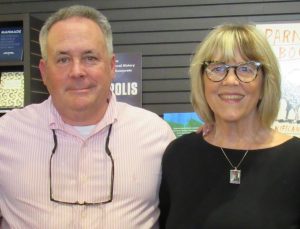
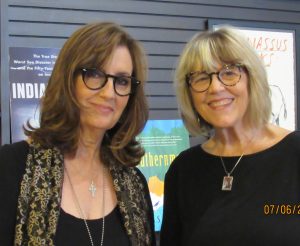 But when I asked for events for future books, I found the door was closed to me, because I couldn’t guarantee a certain number of people would attend. Since I lived in Memphis and not Nashville, and wasn’t that well known, they wouldn’t take a chance on me. I was disappointed, but I understood that their business model had changed with their enormous success and popularity. What I wasn’t prepared for was that they also would not even carry my books in their store.
But when I asked for events for future books, I found the door was closed to me, because I couldn’t guarantee a certain number of people would attend. Since I lived in Memphis and not Nashville, and wasn’t that well known, they wouldn’t take a chance on me. I was disappointed, but I understood that their business model had changed with their enormous success and popularity. What I wasn’t prepared for was that they also would not even carry my books in their store.
Politics?
I’m not saying that there was anything political about Parnassus’ decisions, although I was most disappointed when they rejected my novel John and Mary Margaret, which is about a Black boy from Memphis and a white girl from Jackson, Mississippi, who fell in love on the Ole Miss campus in the 1960s. The book covers over fifty years of civil rights history in Memphis and Mississippi. Friss says:
Every bookstore is, in a way, political. Like publishers, booksellers must make difficult and often public decisions about what crosses the line.
He went on to talk about censorship and cancel culture and Trump. I can only hope that John and Mary Margaret didn’t make the cut simply because I wasn’t a literary super-star. Friss ends the chapter with these words:
Meanwhile, Patchett kept at it. Not just to sell books but to keep telling the story—the one about the little, mighty, and resilient independent bookshop.
Also Not Mentioned
Two more of my favorite bookshops were also NOT mentioned in the collection, and I want to give them both a shout-out here.
Novel Books in Memphis
Like Parnassus in Nashville, Novel in Memphis was originally a Davis-Kidd book store. When it closed, it reopened first as the Booksellers at Laurelwood and later as Novel. The booksellers at Novel are so knowledgeable and helpful. They have hosted me for several book launches since 2017—both in-person and virtual—and they carry most of my books.
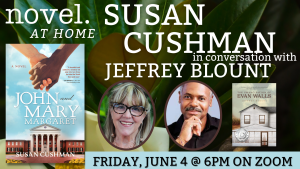
Lemuria in Jackson, Mississippi
Lemuria was started in 1975 in my home town, Jackson, Mississippi, by John Evans, first located in The Quarter and then Highland Village, and finally in its current location in Banner Hall since 1988. Like at Novel, the talented booksellers and events personnel at Lemuria are great, and they have also welcomed me for numerous in-person and virtual events, and carry a number of my books. They are the official booksellers for the annual Mississippi Book Festival.
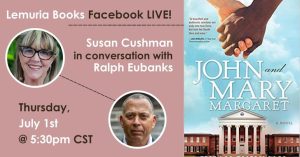
The Verdict?
In the end I really enjoyed The Bookshop and recommend it highly. It was fun to read the stories of all the bookshop owners over several centuries.
